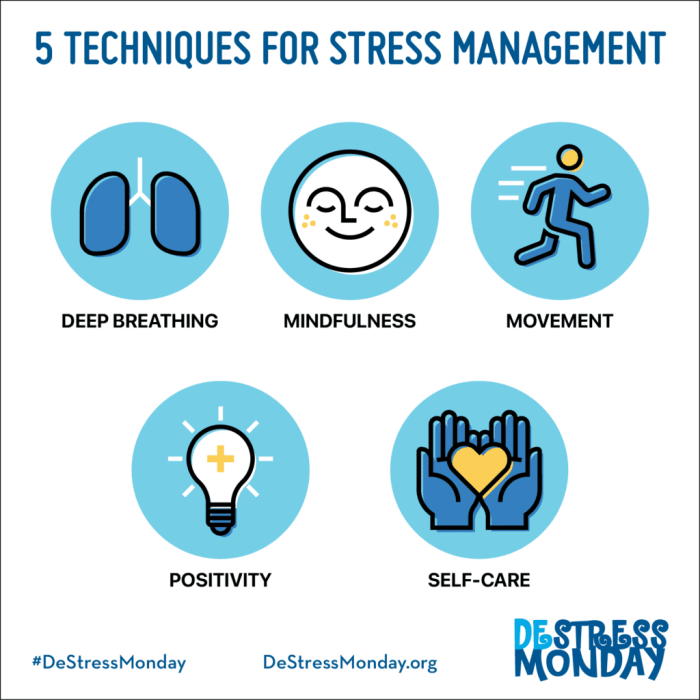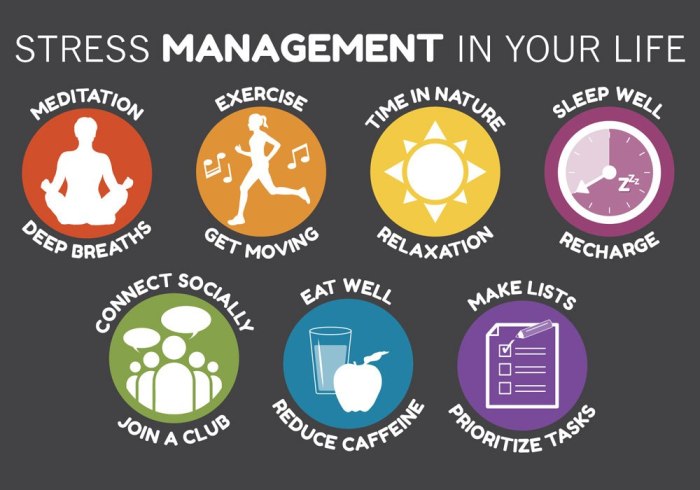Stress Management Tips: Let’s dive into the world of stress management with some cool strategies to keep you chill and composed. From understanding stress to creating a personalized plan, we got you covered with all the deets you need.
Understanding Stress
Stress is a natural response to challenging situations that can affect both our mental and physical health. It can manifest in various ways, such as feeling overwhelmed, anxious, or irritable. The impact of stress on our overall well-being should not be underestimated.
Acute vs. Chronic Stress, Stress Management Tips
Acute stress is short-term and often triggered by specific events, like giving a presentation or meeting a deadline. While chronic stress is prolonged and can result from ongoing issues like financial problems or relationship conflicts. Both types of stress can have negative consequences if not managed effectively.
- Acute Stress: Examples include getting stuck in traffic, receiving unexpected news, or preparing for an exam.
- Chronic Stress: Examples include work-related stress, family issues, or health problems that persist over time.
It’s essential to recognize the signs of stress and take proactive steps to address it before it escalates.
Identifying Signs of Stress

Stress can show up in various ways, impacting individuals physically, emotionally, and behaviorally. It’s important to recognize these signs to address stress effectively.
Physical Symptoms
- Headaches
- Muscle tension
- Fatigue
- Upset stomach
Emotional Symptoms
- Anxiety
- Irritability
- Sadness
- Feeling overwhelmed
Behavioral Symptoms
- Changes in appetite
- Difficulty concentrating
- Increased use of substances (e.g., alcohol, tobacco)
- Withdrawal from social activities
Stress can manifest differently in individuals based on their coping mechanisms, personality traits, and life circumstances. For example, one person may experience stress as physical tension, while another might show emotional symptoms like anxiety.Stress can also affect sleep, appetite, and mood. For instance, someone under stress may have trouble falling asleep or staying asleep, leading to fatigue during the day.
Stress can also cause changes in appetite, either increasing or decreasing food intake. Mood swings, irritability, and feelings of sadness are common emotional responses to stress that can impact overall well-being.
Healthy Coping Mechanisms
Self-care is crucial in managing stress as it helps individuals maintain their physical, mental, and emotional well-being. By incorporating healthy coping mechanisms into daily routines, individuals can effectively reduce stress levels and improve overall quality of life.
Exercise
Regular physical activity, such as exercise or yoga, can help reduce stress by releasing endorphins, improving mood, and promoting better sleep. Engaging in activities that you enjoy can also distract you from stressors and boost your overall sense of well-being.
Meditation and Deep Breathing Techniques
Practicing mindfulness through meditation and deep breathing exercises can help calm the mind, reduce anxiety, and enhance focus. These techniques can be easily integrated into daily routines and provide a sense of relaxation and inner peace.
Hobbies and Social Support
Engaging in hobbies that bring joy and fulfillment can serve as a healthy outlet for stress. Connecting with friends, family, or support groups can provide emotional support, encouragement, and a sense of belonging. Building strong social connections can help individuals navigate stressful situations more effectively.
Time Management
Effective time management strategies, such as prioritizing tasks, setting realistic goals, and delegating responsibilities, can help reduce feelings of overwhelm and increase productivity. By establishing a balanced schedule and creating boundaries, individuals can better manage stress and maintain a sense of control over their daily lives.
Creating a Stress Management Plan: Stress Management Tips

Feeling overwhelmed? It’s time to create a personalized stress management plan to help you navigate through life’s challenges.Setting Boundaries:Setting boundaries is crucial for maintaining your mental well-being. Learn to say no when you have too much on your plate and prioritize your own needs.Prioritizing Tasks:Make a to-do list and prioritize tasks based on urgency and importance. Break down big tasks into smaller, manageable steps to avoid feeling overwhelmed.Practicing Mindfulness:Incorporate mindfulness techniques into your daily routine.
Take a few minutes each day to focus on your breath, meditate, or practice yoga to stay present and reduce stress.
Delegating Responsibilities
Sometimes it’s okay to ask for help. Delegate tasks to others when you feel like you’re taking on too much. Whether it’s at work or at home, sharing responsibilities can lighten your load.
Seeking Professional Help
If stress is impacting your daily life and you’re struggling to cope, don’t be afraid to seek professional help. A therapist or counselor can provide you with the tools and support you need to manage stress effectively.